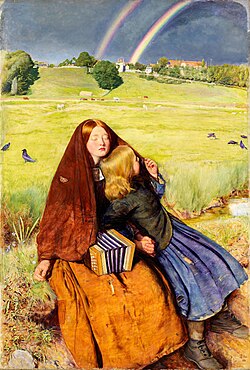This is an old revision of this page, as edited by 92.98.24.125 (talk) at 19:16, 14 November 2011 (rv- I just *gave* you an explanation that you've requested on the talk page in my previous edit summary. I assume you can read, which means your intent here is disruption, not help the article.). The present address (URL) is a permanent link to this revision, which may differ significantly from the current revision.
Revision as of 19:16, 14 November 2011 by 92.98.24.125 (talk) (rv- I just *gave* you an explanation that you've requested on the talk page in my previous edit summary. I assume you can read, which means your intent here is disruption, not help the article.)(diff) ← Previous revision | Latest revision (diff) | Newer revision → (diff)An itinerant is a person who travels from place to place with no fixed home. The term comes from the late 16th century: from late Latin itinerant (travelling), from the verb itinerari, from Latin iter, itiner (journey, road).
Types of itinerants
- Drifters (rogues, rovers, vagabonds, vagrants)
- Perpetual travelers, including illegal aliens (migrants)
- Nomads, including hunter-gatherers and gypsies
- Hobos, including tramps, bums, derelicts
- Refugees and displaced persons
- Street people (street children, paupers, squatters, waifs, schnorrers)
- World citizens
Itinerants throughout history and today
- Freight Train Riders of America (freighthoppers in United States)
- Romani people
- Various indigenous peoples (indigenous peoples, including uncontacted peoples)

- Afar people in Horn of Africa
- Bajau people of Philippines
- Banjara of India
- Bedouin (nomadic Arab people of the desert)
- Beja people in North Africa
- Bushmen of Southern Africa
- Dom people in North Africa and Western Asia
- Eurasian nomads of Eurasian Steppe
- Ghilzai in South-Central Asia
- Indigenous Australians
- Indigenous Norwegian Travellers
- Indigenous peoples of the Americas
- Irish Travellers
- Kuchi people of Afghanistan
- Nomads of India
- Pygmy peoples in Equatorial Africa and parts of Southeast Asia
- Quinqui in northeren half of Spain)
- Scottish Travellers
- Yeniche people in Europe
- Carnies (travelling show-people)
- Hippies, including New Age travellers and Rainbow Travellers
- Jossers (circus artists)
- Kobzari (musicians of Ukraine)
- Lightermen (bargees in England)
- Peredvizhniki (realist artists of Russia)
- Swagmen (homeless transients in Australia and New Zealand)
- Circuit riders and Gyrovagues (Christian ministers and monks)
- Bhikkhus (Buddhist monks)
- Mendicants (beggars of Christianity, Hinduism, Islam, Jainism and Buddhism)
- Pilgrims (religious travellers)
- Sadhus (Jain monks)

Notable itinerants
- Alexander Supertramp
- Kinga Freespirit
- Albert Einstein
- Democritus
- Diogenes of Sinope
- Friedrich Nietzsche
- Jean-Jacques Rousseau
- Mohandas Karamchand Gandhi
- Paul Erdős
- Gautama Buddha
- Historical Jesus
See also
References
- Itinerant Synonyms, Itinerant Antonyms at Thesaurus.com
- Definition of itinerant from Oxford Dictionaries Online
Further reading
- Jack Kerouac (1957). On the Road. Viking Press. ISBN 0-14-118267-9.
- Rolf Potts (2002). Vagabonding: An Uncommon Guide to the Art of Long-Term World Travel. Villard Books. ISBN 0-81-299218-0.